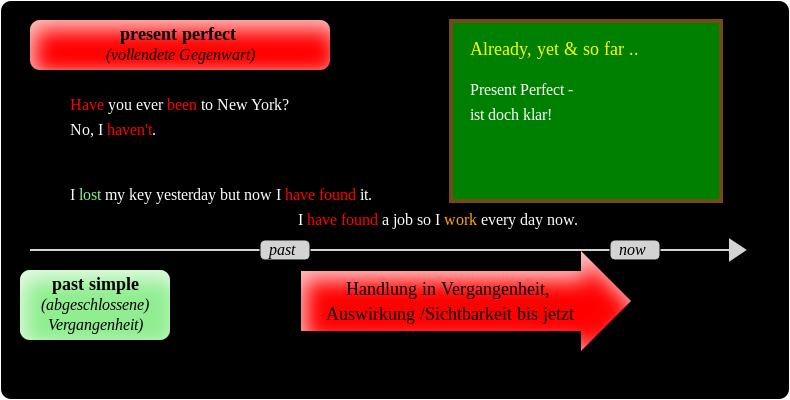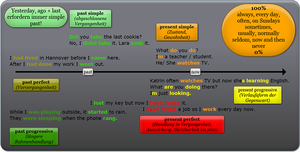Present Perfect/Kontrastierung: Unterschied zwischen den Versionen
(l korr) |
Markierung: Quelltext-Bearbeitung 2017 |
||
| Zeile 13: | Zeile 13: | ||
== Interactive Exercises == | == Interactive Exercises == | ||
=== Have you <span style="color:red">ever</span> … ? === | === Have you <span style="color:red">ever</span> … ? === | ||
Complete the sentences. Watch the signal words! | '''Complete the sentences. Watch the signal words!''' | ||
<div class="lueckentext-quiz" lang="en"> | <div class="lueckentext-quiz" lang="en"> | ||
Have you <span style="color:red">ever</span> ''been (be)'' to Scotland?<br> | Have you <span style="color:red">ever</span> ''been (be)'' to Scotland?<br> | ||
| Zeile 24: | Zeile 24: | ||
<span style="color:#390">The first time</span> it <em> was (be) </em> <span style="color:#390">last year</span> and it <em> tasted (taste)</em> terrible.</p> | <span style="color:#390">The first time</span> it <em> was (be) </em> <span style="color:#390">last year</span> and it <em> tasted (taste)</em> terrible.</p> | ||
</div> | </div> | ||
'''Crazy things''' | '''Crazy things''' | ||
<div class="lueckentext-quiz" lang="en"> | <div class="lueckentext-quiz" lang="en"> | ||
Aktuelle Version vom 12. Dezember 2024, 15:30 Uhr
Anders als im Deutschen ist Present Perfect nicht mit der einfachen Vergangenheit (Past Simple) austauschbar. Mit Hilfe der Signalwörter muss man entscheiden, ob eine Handlung abgeschlossen ist oder Auswirkungen auf die Gegenwart hat.
- What is this page about?
- Read the infographic.
- Watch the video!
- Now try to explain the difference between the tenses!
- Do the interactive exercises.
Interactive Exercises
Have you ever … ?
Complete the sentences. Watch the signal words!
Have you ever been (be) to Scotland?
Yes, I have (???).
I went (go) there last year.
Have you ever tried (try) porridge?
No, I haven't (???).
I have already eaten|'ve already eaten (already, eat ) it twice in my life.
Crazy things
Have you ever played (play) with Nessie?
Yes,I have (???).
Have you ever bitten (bite) a dog? No, but a dog tried (try) to bite me last year.
Have (???) you ever drunk (drink) out of a toilet?
No, I haven't (???). But when I was a kid a drank (drink) out of a puddle (Pfütze).
Complete the sentences. Watch the signal words!
a. Have () you already seen(see) the monster of Loch Ness?
Yes, I have. I saw (see) it yesterday.
b. Have() you ever tried (try) this new ketchup?
I wanted to but I didn't see (not,see) it the last time.
c. Have (???) you thought (think) of the shampoo?
Look! I have already taken|'ve already taken (already, take) it in the trolley.
d. Hey. You didn't remember (not, remember) me to get a new toothbrush when we saw that special offer.
e. Oh my God. I have forgotten|'ve forgotten (just, forget) my purse. Can you help me?
No problem. I 've just been (be) to the bank.
Present Perfect or Simple Past?
Present perfect or past simple? Look at the signal words and fill in the correct forms! (positive or negative)
A: Do you like London?
B: I don't know. I haven't been(not, be) there yet.
A: Have you seen Ann?
B: Yes, I saw(see) her five minutes ago.
A: That's a nice sweater. Is it new?
B: Yes, I bought(buy) it last week.
A: That's a nice sweater. Is it new?
B: Yes, I have just bought|'ve just bought (buy, just) it.
A: Are you tired this morning?
B: Yes, I went (go) to bed late last night.
A: Do you want the newspaper or can I have it?
B: You can have it. I have already read|'ve already read ( already, read) it.
A: Are you enjoying your new job?
B: I haven't started (not, start) yet. My first day is next Monday.
A: The weather isn't very nice today, is it?
B: No, but it was(???) very nice yesterday.
A: Was Lea Sommerer at the party on Saturday?
B: I don't think so. I didn't see(not, see) her there.
A: Is your son still at school?
B: No, he left(leave) school two years ago.
A: Is Sylvia married?
B: Yes, she has been|'s been (be) married for five years.
A: Have you heard of George Washington?
B: Of course. He was (be) the first President of the United States.
At the bank
Present perfect or past simple? Look at the signal words and fill in the correct forms!
Ms Boyd and her husband are in the bank. They are talking to the bank manager.
Manager: "Good morning. Can I help you?"
Ms Boyd: "Yes, we booked (book) a holiday in Canada three months ago and picked up (pick up) the tickets from the travel agent a week later. But we haven't got (not get) any Canadian money yet."
Manager: "Have you already decided (you, already, decide) how much you need?"
Ms Boyd: "We talked (talk) about that yesterday and we need 5,000 Canadian $."
Manager: "Did you call (you, call) us a day before?"
Mr Boyd: "Yes, we phoned (phone) in the afternoon."
Manager: "The money hasn't come (not, come) from the main bank yet."
Ms Boyd: "That's not good."
Manager: "Wait a minute. I checked (check) the money an hour ago but perhaps it has come (come) since then."
Manager: "A man has just brought (just, bring) the money from the main bank. lt is here."
Mr Boyd: "We haven't asked (not, ask) yet how much a Canadian dollar is."
Manager: "I checked (check) yesterday and 5,000 dollars were (be) 750 pounds. But I haven't looked (not, look) today yet. Though I think it's the same."
Mr Boyd: "That's OK. Thank you."
Manager: "Good morning. Can I help you?"
Ms Boyd: "Yes, we booked (book) a holiday in Canada three months ago and picked up (pick up) the tickets from the travel agent a week later. But we haven't got (not get) any Canadian money yet."
Manager: "Have you already decided (you, already, decide) how much you need?"
Ms Boyd: "We talked (talk) about that yesterday and we need 5,000 Canadian $."
Manager: "Did you call (you, call) us a day before?"
Mr Boyd: "Yes, we phoned (phone) in the afternoon." Manager: "The money hasn't come (not, come) from the main bank yet."
Ms Boyd: "That's not good."
Manager: "Wait a minute. I checked (check) the money an hour ago but perhaps it has come (come) since then."
Manager: "A man has just brought (just, bring) the money from the main bank. lt is here."
Mr Boyd: "We haven't asked (not, ask) yet how much a Canadian dollar is."
Manager: "I checked (check) yesterday and 5,000 dollars were (be) 750 pounds. But I haven't looked (not, look) today yet. Though I think it's the same."
Mr Boyd: "That's OK. Thank you."
Present Perfect - ist doch klar!
- Interactive Exercises 1 (regelmäßige Formen)
- Exercises 2 (unregelmäßige Formen)
- Kontrastierung (Gegenüberstellung) von Present Perfect und Simple Past
- How long …? - since & for (regelmäßige Formen)
- Present Perfect Progressive
Past Tense:
Present Tense:





